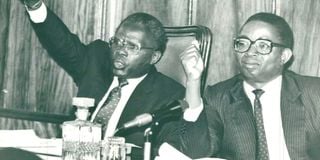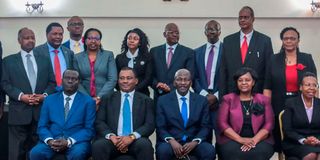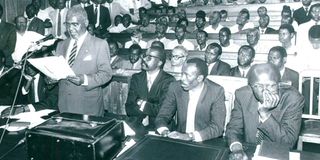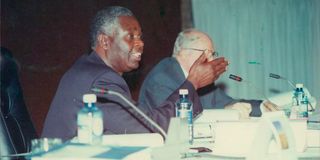Premium
Shakahola probe: Inside Kenya’s past toothless bulldogs in commissions of inquiry

Then-Commissioner Justice Richard Otieno Kwach (left) and the Ouko Judicial Commission of Inquiry chairman, Mr Evans Gicheru, raise a point during the proceedings.
As chairman of a parliamentary committee probing the assassination of Josiah Mwangi Kariuki in 1975, Kimilili Member of Parliament Elijah Wasike Mwangale opted to vent his frustration through an oral narrative. A hyena, he told to the House, once came across a stone and stopped by to salute it. But the stone did not respond, to which the hyena retorted, “Even if you have not responded, you have heard.” And with those few remarks, Mwangale tabled the committee’s report.
The allegoric implication of the message by Mwangale – then a firebrand youthful politician and later an influential cabinet minister in the Daniel arap Moi administration – was that Jomo Kenyatta’s government and a section of legislators in the Third Parliament were not keen on unravelling the circumstances of the death of “JM”, as the Nyandarua North MP was famously known. And true to Mwangale’s projection, the populist politician’s death is to date still one of the country’s unresolved high-profile murders.
To this day, most parliamentary murder probe committees, task forces and judicial commissions of inquiry have suffered the fate of the “muted stone” Mwangale described. This precisely explains the muted response, in some quarters, to President William Ruto’s decision to set up a judicial commission of inquiry to probe the much-publicised cult deaths in Shakahola, Kilifi County.
Indeed, the President’s latest move begs a host of questions. What will be the scale of public investment in this process and will it provide value for money? Will the commission’s findings be judiciously implemented and culprits – if any – prosecuted, or will the report, once handed over, gather dust on the shelves as has been the case in some instances? Or will the execution of some of the recommendations be suspended, or trashed altogether, on account of political interests and sensitivities as we have seen before?
Even more addling is the fact that several investigative processes, including an 11-member committee of the Senate to probe the mysterious deaths in Shakahola, are already ongoing. Separately, Pastor Paul Mackenzie of Good News International Church and televangelist Ezekiel Odera of New Life Prayer Centre are in police custody facing possible charges of murder for the killings of over 100 people. They are suspected of indoctrinating followers into fasting to death on the belief that they will ascend to heaven to meet Jesus Christ.

Attorney-General Justin Muturi (seated, second left) and Justice Eric Ogola (seated, centre) with members of the Commission of Inquiry into the Shakaola Tragedy at Milimani Law Court on May 9, 2023.
Human rights lawyer Harun Ndubi wonders how all this sits with the commission arrangement: “How do they bring an inquiry outside the police process when these two (Mackenzie and Odero) have been charged and the courts are already hearing their defence?”
Optimistic Ruto
But an optimistic Ruto believes the exercise will help to weed out “the characters who want to abuse religion to run businesses and things that are anti-religion in the republic”. Already, local administrative officials, security heads, and investigation and intelligence officers have been transferred from Kilifi to pave the way for the probe. The commission had yet to be set up one week after Ruto’s announcement, nor had its terms of reference been outlined.
In the meantime, opposition leader Raila Odinga is opposed to Ruto’s plans, claiming that the President is an interested party. According to the former Prime Minister, the two suspects are the President’s faith leaders “who even attended his so-called cleansing ceremony of State House”.
Incidentally, the President’s action came only a day after the political party of one of his key allies, Speaker of the National Assembly Moses Wetangula, waded into the Shakahola drama. Through a statement signed by party Secretary-General John Chikati, Ford-Kenya appealed to Ruto to form a commission of inquiry into the Shakahola massacre, arguing that it would be the best way to help the country “understand what really happened”.
Ford-Kenya’s case for the commission is curiously pegged on the notion that “Kenyans have lost trust in the police”, especially after ignoring red flags which the party believes could have prevented the deaths.
It is worth noting that the proposed commission of inquiry, in this case, is inquisitorial – charged with ascertaining the facts of the issue. This is totally different from investigatory inquiries – those formed to gather information for policy formulation or review.
The former have since Independence been used by different governments to seek answers to weighty and seemingly elusive issues. They were a favoured tool in the Moi and Mwai Kibaki regimes, in particular. However, a cursory survey of the results of commissions of inquiry by the Africa Centre for Open Governance (AfriCOG) over the last quarter century raises disturbing questions about whether such inquiries serve any purpose at all.
The Cecil Miller Commission was set up in 1984 to investigate whether former Attorney-General Charles Njonjo “had conducted himself in a manner prejudicial to the security of the State, the position of the Head of State, the image of the President and the Constitutional government of the Republic of Kenya”.
AfriCOG argues that the open inquiry could only have directly and materially benefitted one aggrieved party – President Moi. The climax of the inquiry was when Njonjo was labelled “a traitor” for reportedly plotting a coup against the government, a development that quietly pushed him into retirement – perhaps the prime desire of the architects of the expensive exercise.
And then there was the Gicheru Commission on the death of Dr Robert Ouko, who was Foreign Affairs minister at the time of his death in 1990. When it became clear that the inquiry was moving in an uncomfortable direction for the government, it was disbanded. Like JM’s case, the matter remains unresolved to date.
Delayed release of reports
AfriCOG also points to another disturbing trend in the commissions – the delayed handing over or release of reports. The 1995 release of a report on devil worship in schools was, for instance, done secretively. The agency regrets that a number of recommendations made in the report would have required an open and high-profile release for successful implementation.
Then there was the 1998 Akiwumi Commission, which investigated ethnic cleansing that had occurred in parts of Kenya, particularly during elections. Owing to high political stakes and interests, the release of its findings proved a delicate issue and the implementation of recommendations even more slippery. The Attorney-General at the time, Amos Wako, attributed the delay in the release of the report to fears that it would prejudice the administration of justice in relation to the intended prosecution of persons adversely mentioned in the report.

Mr. Justice Muli addressing the Ouko Inquiry Commission in Kisumu.
Similarly, the Goldenberg Commission of Inquiry, which investigated a financial scandal involving businessman Kamlesh Pattni completed its work in October 2005, but its chairman, Justice Bosire, only presented its report to President Kibaki in February 2006.
The 2003 Ndungu Commission, which dealt with the irregular or illegal allocation of public land, made a series of findings of fact, that ascribed responsibility for established wrongdoing to a number of individuals. To date, the government has not implemented most of these foundational recommendations by the Commission, appointed by Kibaki.
In fact, then-Justice and Constitutional Affairs Minister Kiraitu Murungi expressed fears that implementing the Ndung’u report fully would rattle the status quo and even engineer land clashes across the country.
Much later, despite receiving a 2,200-page report from the Truth, Justice and Reconciliation Commission (TJRC) soon after assuming office, former President Uhuru Kenyatta opted to keep mum on its contents. Nevertheless, he made a blanket apology to Kenyans during his State of the Nation address in March 2015 for past wrongs committed by his government and previous ones. An apology was one of the recommendations of the TJRC, set up following the 2007 post-election violence.
Other commissions
Other post-poll commissions were chaired by retired South African judge Johann Kriegler, whose team made a raft of recommendations that included the setting up of an independent agency to manage elections and an integrated and secure tallying and data transmission system, and Judge Philip Waki, whose Commission of Inquiry into Post-Election Violence set out to investigate clashes following the highly disputed 2007 presidential poll.
The TJRC, Kriegler and Waki commissions were relatively successful for two main reasons – that they were strictly time-bound and were quasi-international, closely monitored by the African Union and United Nations.
Nonetheless, Ndubi maintains that most commissions of inquiry are a waste of time and tax-payers' money. Pointing out that they are not legal processes, the lawyer argues that the police should be accorded a free hand to investigate and thereafter hand over the cases to the judiciary for prosecution. His argument is that judicial commissions are by nature judicial processes, which mostly rely on judicial officers in their undertakings – a factor that makes the said officers investigators and judges at the same time.

Mr Justice Samuel Bosire, the chairman of the Goldenberg Commission Inquiry and Commissioner Peter le Pelley (right) during the investigation's 99th sitting.
This approach complicates the entire justice equation since there is shared responsibility between the police, prosecutors and judges. Unlike the French system, for instance, which is mainly inquisitorial – meaning the judiciary can undertake investigations and then preside over cases of the same – Ndubi points out that Kenya’s is an adversarial system, in which the accused comes face to face with the accuser. The latter requires a clear separation of roles.
However, Ford-Kenya argues that the commission route is the best and that it has its job cut out for it. Chikati, who is also Tongaren MP, particularly wants investigations undertaken into allegations of organ trafficking to Western countries following reports that some of the bodies exhumed in Shakahola were missing vital organs.
While some commissions are probably set up for cover-up purposes, Ndubi believes Ruto was not in the know about what happened in Shakahola and has no intention of glossing over the matter. Nevertheless, he considers setting up a judicial commission of inquiry unconstitutional.
Still, a commission of inquiry could offer the President the best opportunity to break from the past by firmly and truthfully overseeing the process in a transparent fashion. Implementation of recommendations made would provide a positive turning point for judicial commissions of inquiry, whose history is largely characterised by opaqueness and lack of execution.




